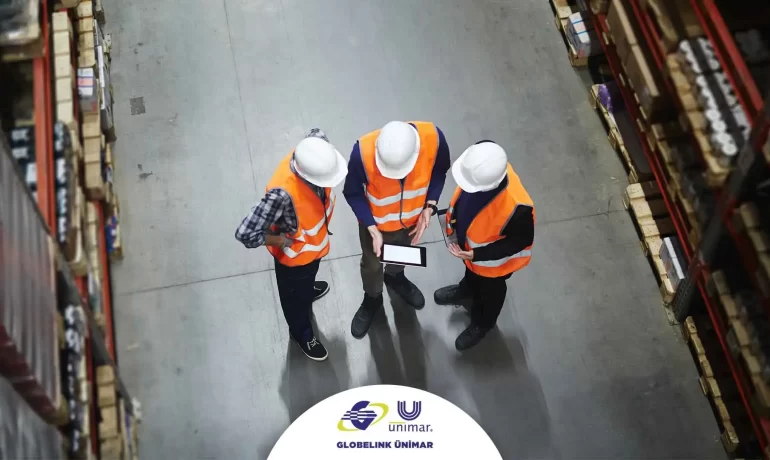
- March 22, 2021
- Blog
Since the beginning of 2020, several countries around the world have closed their borders and restricted transportation to take the pandemic under control. They banned traveling unless necessary. This situation has created some obstacles in both international trade and transportation. The global slowdown in economic activities, the break in the supply chain due to the closing of borders, the decrease in production, and the decreasing demands for nonessential products caused the restriction of logistics activities, as well. As a result of all this, the global logistics industry experienced an economic contraction.
The figures revealed indicate that the international logistics industry experienced a 6.1 percent decrease in gross added-value. The estimated impact of the pandemic on logistics markets varies between countries, from a decrease of 0.9 percent in China to a decrease of 18.1 percent in Italy. It is forecasted that the global shipping transportation market shrank by 7.5 percent in 2020 compared to 2019. Global technology market consulting firm ABI Research states that the truck market experienced a decline of more than 25 percent and a significant contraction.
The air transport industry was affected most by the pandemic compared to other industries. The air cargo volume decreased 19 percent globally between March 2019 and March 2020. According to Statista, the estimated size of the worldwide air transport market was 34 million metric tons before the pandemic. In addition to this, the fact that road transport came to a halt and the emergence of miles of queues at border gates, especially in the early stages of the pandemic, the interruption of air transport, and the increase in freight and costs in the maritime industry showed the importance of having different transport modes on behalf of logistics companies in reducing the risks. Intermodal transport came to the fore as one of the ways to transport with the least damage and human contact in this tough period.
The modes of transportation in which human contact is minimized have become more popular with the acceleration in environmental technologies as well as the demand for the continuity of the supply chain during the pandemic. In addition to these two features, intermodal transport increases the interest in itself thanks to the cost advantage it creates. Measures to limit physical contact began to be implemented in Europe, the USA and many other countries. In addition to transferring document transactions to a digital environment for the protection of drivers and personnel, the development of contact-free terminals was also accelerated.
Defining intermodal as one of the important transport modes of the future, experts emphasize the importance of increasing the share of rail and sea transport in terms of establishing a fast, flexible, safe, reliable and integrated transport system and consider it as one of the key elements to increase competitive power. It is also stated that companies that do not provide services in this field will have difficulties in the future.
Intermodal Market Will Grow 8.3% in 2020-2025
When considering new ways to reduce freight costs and carbon footprints, companies now have to consider an alternative mode of transport options at the point of transporting long-haul freight. At this point, one of the most successful options is intermodal transport. More and more companies are investing in intermodal transport since it is an environment-friendly mode that reduces costs. Research by Research and Markets shows that the intermodal market will grow by 8.3 percent between 2020- 2025. Technavivo Plus company’s research predicts that the intermodal transport market will grow by 6 percent in four years and reach $ 49.8 billion. On the other hand, the research shows that freight transportation costs which will reduce thanks to intermodal transport will be one of the main actors that will drive the market. The government and regulatory agencies set various strict regulations to reduce vehicle emissions. The European Green Deal, which the European Union wants to put into practice, is a good example of this. In addition, the increase in the number of road freight transporters increases traffic congestion and causes associated delays. All of these factors force shipping companies to use a combination of sea, road and rail to transport goods on longer routes. This is a situation that will benefit both the consignor and the shipping company in terms of costs. For this reason, many shippers have started to prefer intermodal freight transport over a single mode of transport.
Although road freight transportation continues to stand out as the most dominant mode in the logistics of countries, intermodal is a more economical transportation method for distances of 800 thousand kilometers and above. Optimizing the strengths and efficiency of each shipping method, intermodal transport ensures safer transportation of the freight by helping handling operations and reducing damage and losses.
According to the Supply Chain Management Specialists Logistics Status report, transportation accounts for 66 percent of the total logistics costs. Road transport challenges, such as the inability to proactively manage the transport network, lack of drivers and truck transportation regulations that hinder productivity, are expected to increase costs as the capacity in this area will shrink in the coming years. Experts say that companies should deploy the intermodal solution as a solution to minimize supply chain disruptions, reduce supply risk, and reduce shipping costs.
Intermodal transport is expected to drive the container fleet market during the forecast period. Rail transport currently dominates the segment in intermodal transport, however, road and sea transport constitute the rapidly growing segment of the global intermodal transport market.
Turkey Should Increase the Share of Rail in Intermodal Transport
For all these reasons, it is thought that while increasing the share of intermodal transportation rapidly, it will introduce a new understanding of competitiveness and redistribute the cards in the industry. Besides, the EU’s efforts in the issue of zero carbon footprint within the scope of the Green Deal and its desire to create a greener trade and transportation in this direction will inevitably shape its partners. At this point, Turkey stands out as one of the most crucial countries. It is said that Turkey, which is an important trading partner of the EU and which carries out a large number of transportation activities towards these countries, will increase its share of the European continent through intermodal transport mode. Due to its high logistics potential which provides access to Eastern Europe, Central Asia, the Middle East and North Africa, Turkey is one of the most strategic countries for the European Union in terms of intermodal transport. Experts say that with this system, Turkish companies will minimize their expenses and increase their competitiveness, and add that there is a need for a holistic policy that will integrate transport investments with global transport policy and intermodal understanding. Rail transport stands out as an important factor in strengthening intermodal transportation. It is emphasized that the rail network needs to be expanded, modernized, and its connections with ports are expanded. Besides, there is a need for an infrastructure that will allow transition between modes in industrial zones. On the other hand, the utilization of sea transport, which has great potential, and increasing port capacities are also underlined. At this point, it is also important to reduce the dependence on road transport, which brings huge costs.
At this point, General Manager of Transportation Services Regulation Mr. Murat Baştor points out that the share of rail and sea transport will be increased by saying “Intermodal transportation stands out as the most effective solution, especially due to the problems such as the transit document quota and the density at the border gates encountered in our transport to Europe. In the upcoming period, we plan to establish a more competitive and sustainable transportation system that will support our country’s exports with intermodal transportation alternatives such as new Ro-Ro lines, block trains/containers.”
UTIKAD Board President Mr. Emre Eldener drew attention to the critical role the rail transport played during the pandemic and said: “Export shipments by rail, which were recommended as “contact-free trade” against the spread of the pandemic, increased by almost 100 percent in March. Wagons were insufficient on some lines. An additional 3 thousand 500 tons of capacity increase was achieved on the Baku-Tbilisi-Kars (BTK) line with the cessation of transit to Iran by road vehicles during the pandemic. With the hygiene measures taken, contact-free transportation and commercial activities, there was an increase of 36 percent compared to the same period of the previous year and the amount reached 2 million 133 thousand tons in rail freight transportation.
Mr. Eldener emphasized that rail transport plays an important role in the continuity of trade with Europe and said: “Rail may be one of the most important factors in continuing our exports to the Middle East and the Caucasus, but also to Southeast Europe and Central Europe.”
Intermodal transport, which is commonly used in Europe in accordance with the technological advances, the necessity of cost reduction which is brought by global competition, the acceleration of the transport, the need for reducing the congestion in road transport and environmental policies, is newly developing in Turkey and there are some studies carried out on it. The share of this mode in total logistics is currently around 1 percent. However, some studies have been done to increase this in recent years. The leading one of these studies is the Great Anatolia Logistics Organizations (BALO) project initiated under the leadership of the Union of Chambers and Commodity Exchanges of Turkey (TOBB). With the project, intermodal services are provided mainly by rail between Anatolia and Europe. Baku-Tbilisi-Kars railway projects known as Marmaray and Iron Silk Road, TRACECA Corridor, Ro-Ro lines between the ports of Pendik, Ambarlı, Alsancak, Yalova, Çeşme and Mersin and the ports of Italy-Trieste, France-Toulon and Sete, Greece-Lavrio and between Taşucu and Kyrenia, and Mersin, Çandarlı and Filyos port projects are important projects for the development of intermodal transportation networks. The EU aims to create a transport infrastructure between Turkey and itself and thus, to articulate this infrastructure to the European networks by rebalancing the freight transportation, which is mainly carried out by the road, in favor of rail and sea.
On the other hand, some policies and measures took place on the 11th Development Plan for carrying Turkey’s physical infrastructure opportunities to a better point through the current logistics regulation. Within the scope of the 11th Development Plan, the issues of developing intermodal and multimodal practices by utilizing Turkey’s geographical advantage and increasing the share of rail and sea transport were defined as the main objectives for the competitive power in the field of “Logistics and Transportation”.
Eldener: “Rail Transport Has Acted as a Savior in the Pandemic”
Emphasizing that the problems experienced in air, road and sea transport during the pandemic made rail transport an important alternative, UTIKAD President Mr. Emre Eldener says that the demand for this mode of transport, which is recommended as “contact-free trade” against the pandemic, has increased.
Mr. Eldener stated that the railroad and intermodal transport, which served as a savior during the pandemic, began to lose the interest it had drawn slightly with normalization and that this situation led to an imbalance between imports and exports. He said that imports came to a halt as a result of this and added: “The extra costs paid to the rented vehicles and containers for empty turns in imports have put companies into a difficult position, but most importantly, the production of raw materials may also be affected at the end of this process. There is also concern that the order of export shipments, which is currently stable, will deteriorate in this cycle. At this point, I believe that the importance of rail transport should be grasped well. Because, unfortunately, rail transport is the most under-developed and even the only under-developed mode of transport in our country. And I would like to underline that it is the mode of transport that we need most today. However, although it seems that there was a great demand for the rail transport in the early stages of the pandemic, the industry turned back to its starting point on the road transport since the necessary investments have not been made in this transport mode.”
Kurtar: “Intermodal Transportation Will Maintain its Global Growth”
Globelink Ünimar Int’ Landfreight & Intermodal Manager Pelin Kurtar: “The difficulties of the pandemic have shown how important it is to have different transport models. Strengthening its presence in this difficult period, intermodal has become one of the transportation modes that received the least damage and yielded significant returns. I believe that following the increasing focus on digitized and minimum human contact trade, the value of the intermodal supply chain will increase more. As a company following all global developments and changes closely and integrating these into the customer satisfaction system and sustainable business quality, we are trying to deepen our presence in this field where we have been serving for many years. We closely monitor all vehicles in this mode in order to facilitate unaccompanied transportation.
As Globelink Ünimar, we offer an uninterrupted and trouble-free service as an alternative to road transportation with our intermodal transportation method, in which we have been successfully operating for four years. We transport the freight from Turkey to several European countries, particularly the UK, Germany, Belgium, France, Ireland, Spain, and Italy using direct rail services or Ro-Ro + railway services. On the other hand, we have increased our interest in the Turkic Republics in rail transportation. We aim to increase our share in rail transportation with the investments we will make in the light of our experiences on the road, sea and air transportation.
The flexible and fast transportation opportunity offered by intermodal transportation has reduced the negative effects of the pandemic as well as the geography. Both our company and our customers have thus minimized their cost losses and received services with an environmentally friendly transportation model as a result of the reduction of carbon emissions. We do our best to add value to our customers and keep them more globally competitive through our services in this field. On the other hand, we regularly share with our customers the most appropriate methods that can be followed within the scope of restrictions and measures in line with the process.
With the awareness that intermodal transportation will continue to develop in line with digitization, we will continue to develop our technological infrastructure and transfer technology to our processes. We will continue to work to increase our share in intermodal transportation, taking into account issues such as market freight balance, cyclical changes, differences in customer demands, and global measures.”
Artificial Intelligence is Both Changing and Transforming
Today, we can see the clues that we will
The Future of the Cargo Market is Shaped by e-commerce
The e-commerce industry has been growing rapidly since the



